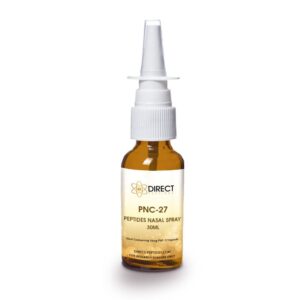Buy PNC-27 Peptide Hungary
Buy PNC-27, a synthetic anticancer peptide designed to target cancer cell membranes, inducing cancer cell lysis while sparing normal cells, offering potential as a promising treatment option for various tumor types, including pancreatic and leukemia cells.
Shop our Full Range of PNC-27 Peptides
-
Sale!
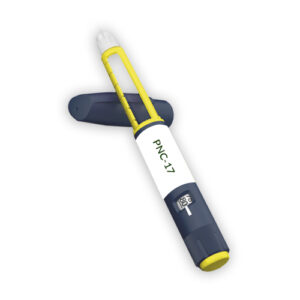
PNC-27 Pre-Mixed Pen 5mg Peptide
£105.71 – £285.40Price range: £105.71 through £285.40 This product has multiple variants. The options may be chosen on the product page -
Sale!
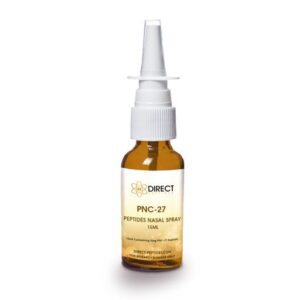
PNC-27 Nasal Spray
£111.13 – £217.25Price range: £111.13 through £217.25 This product has multiple variants. The options may be chosen on the product page -
Sale!
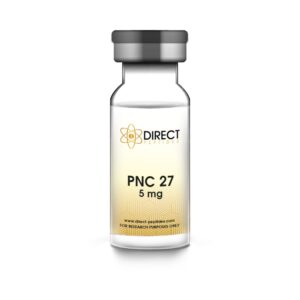
PNC-27 Peptide Vial
£103.13 – £112.11Price range: £103.13 through £112.11 This product has multiple variants. The options may be chosen on the product page
What Is PNC-27?
PNC-27 is a 27 amino acid synthetic peptide designed to target cancer cells. It works by binding to the membranes of cancer cells and causing their destruction, while leaving healthy cells untouched. This selective action is possible because It targets specific proteins found on the surfaces of cancer cells.
It has shown promise in treating various cancers, including solid tumors, pancreatic cancer, and leukemia. With its unique properties, the peptide offers a new approach to cancer treatment, aiming to reduce the side effects often seen with traditional methods like chemotherapy.
PNC-27 Mechanism Of Action
PNC-27 works by targeting a specific protein, known as HDM-2, which is overexpressed on the surface of cancer cell membranes. HDM-2 plays a crucial role in tumour development and progression, making it an ideal target for therapeutic intervention. Once it binds to HDM-2, it integrates into the cancer cell membrane, disrupting its integrity and leading to cell lysis.
This process causes the cancer cell to rupture and die while leaving normal cells unharmed due to the absence of HDM-2 on their membranes. This precise targeting mechanism not only enhances the effectiveness of the peptide but also reduces the toxic side effects often seen with traditional treatments, highlighting its potential as a revolutionary anticancer therapy.
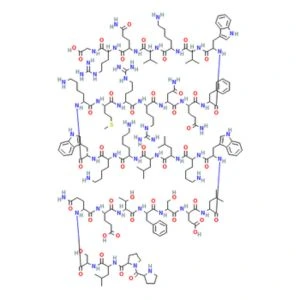
Structure of PNC-27 Peptide
Sequence: Pro-Pro-Leu-Ser-Gln-Glu-Thr-Phe-Ser-Asp-Leu-Trp-Lys-Leu-Leu-Lys-Lys-Trp-Lys-Met-Arg-Arg-Asn-Gln-Phe-Trp-Val-Lys-Val-Gln-Arg-Gly-OH
Molecular Formula: C188H293N53O44S
Molecular Weight: 4031.7
What Are The Research Benefits of PNC-27?
Targeted Cell Death: A 2009 study investigated the peptide’s potential to selectively target cancer cells by binding to the HDM-2 protein, which is reportedly only present in cancer cells [1]. The research used theoretical and experimental methods to explore how it forms stable complexes with HDM-2, possibly creating transmembrane pores that lead to cell necrosis. Visual data showed ring-shaped pore structures on cancer cells but not on normal cells, highlighting it’s selective toxicity. Notably, normal cells modified to express HDM-2 also became susceptible to the peptide, further supporting its specific interaction with the protein [2].
Destruction of Cancer Cells: A 2010 study explored how peptide integrity affects membrane pore formation and cancer cell killing. Researchers labeled the peptide with fluorescent markers to track its structure during interaction with breast tumor cells. After exposure, a yellow luminescence indicated the peptide remained intact while inducing membranolysis in cancer cells, leaving control cells unaffected. This intact structure was linked to selective pore formation, leading to LDH release (lactate dehydrogenase) and causing cancer cell death. The findings highlight the importance of the peptide’s preserved structure for its cytotoxic activity.
The peptide targets cancer cell membranes, like MCF-7 cells, causing lysis by interacting with specific intramembrane targets. These targets are absent in non-cancerous cells, resulting in peptide degradation and uniform fluorescence [3].
Liquid or “Non-solid” Tumor Cells: A 2014 study investigated the peptide’s effects on non-solid tumor cells. The research aimed to determine if these cells express HDM-2 in their plasma membranes and whether the peptide induces tumor cell necrosis through its interaction with membrane-bound HDM-2.
It was tested on non-solid tumor cells, with murine leukocytes as a control. Findings suggested that it selectively targets HDM-2-expressing tumor cells.
It may induce cancer cell death by forming trans-membrane pores through its interaction with HDM-2 in the cell membrane. This effect appears to work independently of p53, as shown in leukemia K562 cells that lack p53 expression [4].
Targets Cancer Cells: It has been shown to cause cell death via necrosis in cancer cell lines such as leukemia, ovarian and pancreatic cancers. A study on the peptide PNC-28, similar to PNC-27 and derived from p53, found it targets HDM-2 proteins in cancer cells. Researchers observed that PNC-28 inhibited ovarian cancer cell growth and reduced tumor size in mouse models [5].
Another study in 2020 investigated the effects of the peptide on non-stem leukemia cell lines, including U937, OCI-AML3, and HL60, chosen for their distinct characteristics. Researchers found that the HDM-2 protein was highly expressed in these leukemia cells, all of which were targeted by the PNC-27 peptide [6].
Buy PNC-27 Peptide Hungary for research purposes online today!
Buy PNC-27 Nasal Spray
Buy PNC-27 nasal spray Hungary, available in convenient 15 ml and 30 ml bottles, providing a non-invasive option for delivering the therapeutic peptide.
This formulation is designed for ease of application and consistent dosing, ensuring optimal absorption and effectiveness.
The nasal spray format offers a user-friendly alternative to traditional administration methods, enhancing comfort and accessibility for patients.
Buy PNC-27 Pre-Mixed Peptide Pen
Buy PNC-27 pre-mixed Hungary 5 mg pen delivers the peptide in a ready-to-use, sterile solution. Designed for accurate dosing and ease of use, it ensures stability, potency, and therapeutic efficacy, making cancer treatment more accessible and efficient.
Pre-Mixed Cartridge Kits include a cartridge (premixed with PNC-27 and Bacteriostatic Water), a pen, carry case, and 3 needle tips. Single Cartridges (1, 2, or 3) come premixed with 3 needle tips but do not include a kit. Save 10% when purchasing 3 cartridges.
Frequently Asked Questions (FAQs) about PNC-27
What makes PNC-27 unique?
It is highly regarded for its specificity and safety profile during research applications. With 99% purity and rigorous third-party testing, it ensures reliability and accuracy for scientific studies.
Is PNC-27 safe for human consumption?
No, it is strictly intended for laboratory and scientific research purposes. It is not approved for human consumption, veterinary use, or any therapeutic application outside of research contexts.
Is PNC-27 legal?
The legality depends on its intended use and the regulations of the country in question. It is legal for purchase and use in laboratory and scientific research settings where such substances are permitted. However, it is not approved by the FDA or other similar regulatory bodies for medical, therapeutic, or human use. Its possession or application outside of research contexts may be subject to legal restrictions. Hungary Researchers are advised to review local laws and guidelines to ensure compliance.
How should PNC-27 be stored?
For optimal stability, it should be stored in a cool, dry place, away from sunlight and heat sources. Always follow the specific storage instructions provided by the supplier.
Why buy PNC-27 from Direct Peptides?
Direct Peptides offers high-quality peptides with 99% purity, ensuring accurate and reliable research outcomes. Each product is third-party tested, giving researchers confidence in the consistency, safety, and performance of their materials.
What are the side effects of PNC-27?
It is not intended for human use, and therefore, any side effects in humans remain undocumented and unresearched. However, researchers working with the peptide should follow all safety guidelines and laboratory protocols to mitigate any potential risks during handling. Always use protective equipment and ensure proper disposal according to research standards.
Buy PNC-27 Peptide Hungary for in vitro and in vivo research use from Direct Peptides.
Summary of Research Applications
- Destroys solid tissue tumor cells.
- Potential to destroy non-solid tumor cells.
- Highly specific targeting to minimise risk to healthy cells.
- Enhanced cytotoxicity.
- Inhibits tumor cell proliferation.
- Enhanced chemotherapy effectiveness.
PNC-27 Peptide Quality Assured
Buy PNC-27 peptide Hungary with 99% purity from Direct Peptides, made for scientific research. Each product is third party tested to ensure high quality and reliability, giving researchers confidence in their results. Count on our peptides for safety, accuracy, and consistent support in your work.
References For Further Reading
[1] Ehsan Sarafraz-Yazdi, Wilbur B Bowne, Victor Adler, Kelley A Sookraj, Vernon Wu, et al (2010) Anticancer peptide PNC-27 adopts an HDM-2-binding conformation and kills cancer cells by binding to HDM-2 in their membranes – Proceedings National Academy of Sciences U S A, 2010 Jan 11, Volume 107 (Issue 5), Pages 1918–1923.
[2] Ehsan Sarafraz-Yazdi, Stephen Mumin, Diana Cheung, Daniel Fridman, et al (2022) PNC-27, a Chimeric p53-Penetratin Peptide Binds to HDM-2 in a p53 Peptide-like Structure, Induces Selective Membrane-Pore Formation and Leads to Cancer Cell Lysis – Biomedicines, 2022 Apr 20, Volume 10 (Issue 5), Page 945.
[3] Kelley A Sookraj, Wilbur B Bowne, Victor Adler, Ehsan Sarafraz-Yazdi, Josef Michl, and Matthew R Pincus (2010) The anti-cancer peptide, PNC-27, induces tumor cell lysis as the intact peptide – Cancer Chemotherapy and Pharmacology, 2010 Jul, Volume 66 (Issue 2), Pages 325-31.
[4] Katlin Davitt, Blake D Babcock, Maly Fenelus, Chi Kong Poon, Abhishek Sarkar, et al (2014) The anti-cancer peptide, PNC-27, induces tumor cell necrosis of a poorly differentiated non-solid tissue human leukemia cell line that depends on expression of HDM-2 in the plasma membrane of these cells – Annals of Clinical & Laboratory Science, 2014 Summer, Volume 44 (Issue 3), Pages 241-8.
[5] Wilbur B. Bowne MD, Kelley A. Sookraj MD, Michael Vishnevetsky, Victor Adler MD, PhD, Ehsan Sarafraz-Yazdi MS, et al (2008) The Penetratin Sequence in the Anticancer PNC-28 Peptide Causes Tumor Cell Necrosis Rather Than Apoptosis of Human Pancreatic Cancer Cells – Annals of Surgical Oncology, Volume 15 (Issue 12), Pages 3588–3600.
[6] Anusha Thadi, Lauren Lewis, Eve Goldstein, Anshu Aggarwal, Marian Khalili (2020) Targeting Membrane HDM-2 by PNC-27 Induces Necrosis in Leukemia Cells But Not in Normal Hematopoietic Cells – Anticancer Research, 2020 Sep, Volume 40 (Issue 9), Pages 4857-4867.
Why Choose Direct Peptides Hungary?
Buy PNC-27 peptide Hungary today from Direct Peptides, your trusted source for quality peptides. We offer a range of formulations, including 5mg peptide vials, 15ml and 30ml nasal sprays, and 5mg pre-mixed peptide pens. Designed to meet diverse research needs, Hungary researchers can easily find the right option for their projects.
ALL CONTENT AND PRODUCT INFORMATION AVAILABLE ON THIS WEBSITE IS FOR EDUCATIONAL PURPOSES ONLY.
DISCLAIMER: These products are intended solely as a research chemical only. This classification allows for their use only for research development and laboratory studies. The information available on our Hungary Direct Peptides website: https://direct-peptides.com is provided for educational purposes only. These products are not for human or animal use or consumption in any manner. Handling of these products should be limited to suitably qualified professionals. They are not to be classified as a drug, food, cosmetic, or medicinal product and must not be mislabelled or used as such.
Related Posts

PNC-27 Peptide For Cancer: How It Targets Tumours And Supports Prevention
PNC-27 is an experimental peptide showing promise in cancer prevention research due to its ability to target HDM-2, a protein overexpressed in cancer cells. Unlike traditional treatments, it selectively induces cell death in malignant cells without harming healthy tissue. While still in early stages and intended for research use, it could play a key role in advancing preventative oncology strategies.
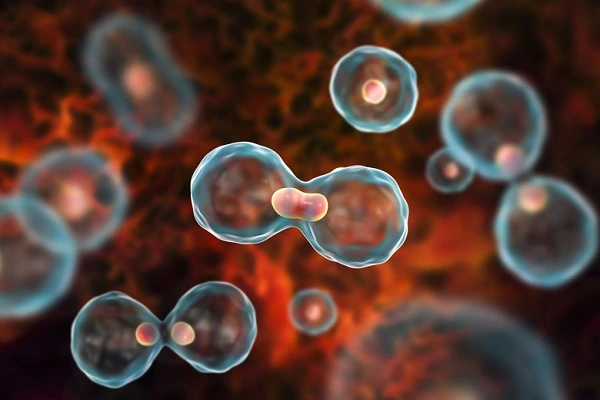
Peptide P21 Benefits in Cell Cycle Regulation and DNA Repair
This blog delves into the critical role of Peptide P21 in cell cycle regulation, DNA repair, and disease prevention. It highlights its applications in cancer research, aging, and regenerative medicine, showcasing how it halts damaged cell division to maintain cellular health. Explore its potential in preventing mutations, supporting stem cell therapies, and advancing treatments for genetic disorders and age-related diseases.

